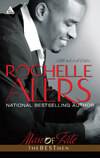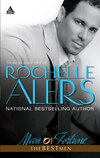Kitabı oku: «Man of Fate», sayfa 4
Chapter 4
Ava gave Kyle a dazzling smile. “What on earth did you bring?” she asked, pointing at the shopping bags he held in each hand.
Kyle winked at her. “Dinner.”
It’d been a little more than twenty-four hours since he’d last seen Ava, and she’d changed dramatically. Her hair was a mass of tiny curls that hugged her head like a cap. She wore a pair of black cropped pants that showed off her shapely legs, black ballet-type flats and a white sleeveless V-neck blouse that displayed toned arms and shoulders. There was still a hint of swelling along the left side of her face and the angry bruise was changing color from deep purple to a sickly greenish-yellow.
Ava reached for one of the bags, but Kyle tightened his grip on the handles. “I’ve got this.”
She flashed an attractive moue. “Oh, it’s like that?”
Lowering her head, he pressed his mouth to her uninjured cheek. “Yes, it is. Where’s the kitchen?”
“Follow me.” Ava led the way through a hallway and into one of the two kitchens in the duplex.
Kyle walked into a kitchen designed for cooking and entertaining. Hollyberry-red cabinetry was a shocking contrast to stainless-steel appliances and neutral-colored walls, granite gray-and-black countertops and backsplashes resembling a mosaic. There was a built-in microwave/convection oven, sub-zero fridge, a wine cellar and a side-by-side commercial refrigerator.
“I love your kitchen.” He was unable to disguise the surprise in his voice.
Folding her arms under her breasts, Ava leaned a hip against the countertop. “I wish I could claim it as mine. I’ll live here until next summer. After that I’ll have to look for another apartment. I’ve been thinking about buying a co-op but I’m not certain where I’d like to live.”
Kyle took off his suit jacket and hung it over the back of a stool. Removing his cufflinks, he rolled back his cuffs and began emptying the canvas bags. “Where are the owners?”
“They’re involved in a project in Saudi Arabia. Professor Servinsky lived in this apartment with his first wife for more than twenty years before she passed away in her sleep. After several years he began dating his neighbor, who was also a widow. He didn’t want to give up his apartment and it was the same with her, so they renovated, turning the two into a duplex. There are three bedrooms on this floor and three upstairs. Each also has a small bedroom off the kitchen, commonly known as the maid’s room. Mrs. Servinsky removed the wall between two upstairs bedrooms and set it up as a solarium.”
“Where do they sleep?”
“They sleep down here and entertain upstairs.”
“Where’s your bedroom?”
“Upstairs. I’ll show you around later,” Ava promised. “Would you like some help?”
Kyle gave her a sidelong glance as he emptied plastic bags of cucumbers, bell peppers, a lemon, tomatoes, scallions and baking potatoes into the sink. The contents of the other bag yielded small containers of fresh mint, garlic, feta cheese and bottles of olive oil and red wine. Her gaze widened when he unwrapped strip steaks with a liberal amount of marbling.
“No. I want you to sit and do absolutely nothing. How do you like your steak?”
“Well done.” The seconds ticked off as she watched Kyle navigate his way around the kitchen as if it were something he did often, opening cabinets for bowls and platters and a drawer with an assortment of knives.
Unable to tolerate complete silence, Ava got up and turned on the radio positioned under a cabinet. The melodious sound of Whitney Houston singing “You Give Good Love” filled the kitchen.
Shifting, she stared at the width of Kyle’s broad shoulders under the white shirt. “I want to thank you for the flowers. They’re beautiful.”
The flowers had been delivered to the apartment when she’d been on the telephone with her supervisor. Earlier that morning she’d scanned the doctor’s note and faxed it to her office. Within an hour she was inundated by a number of telephone calls from her coworkers asking if she was okay or if she needed them to do something for her. The outpouring of support was somewhat unexpected because the atmosphere in the agency had been somewhat strained under the current administration. Threats of resignations were rampant, and Ava was seriously considering looking for another position at the end of the year. She’d had another offer to work for a private agency, but hadn’t wanted to leave the city-funded agency and the disenfranchised clients who came with a myriad of social and mental-health issues.
He inclined his head in acknowledgment. “I’m glad you like them.”
She approached Kyle, watching as he manipulated the pullout kitchen faucet, rinsing the vegetables. The heat from his body and the subtle scent of his cologne wafted into her nose. He looked and smelled good.
“Where did you learn to cook?”
Kyle gave Ava a quick glance. “Before my dad retired, he worked as a chef for the railroad. My mother loved when he was home because she didn’t have to cook. Once we were tall enough to look over the stove he taught his children.”
“At what age did you learn?” Ava asked.
“I had to be eight or nine. My younger brother flat-out refused, while my sister and I became proficient enough so that we could put together an entire meal by the time we were teens. Are you an only child?” Kyle asked, deftly switching the topic from himself to Ava.
“No. There’re four of us: two boys and two girls. My older brother is a warden at a prison in Texas and my younger brother is a naval officer. The last I heard is that he’s aboard a submarine somewhere in the world. My sister Aisha is nine months pregnant and she and her husband are waiting for the birth of their first child.”
“What does your sister do?”
“She’s a teacher.”
“How many grandchildren will it make for your parents?”
“It will be their first. Curtis—he’s the warden—just got married last year but I believe he and his wife have decided not to have children, while Calvin professes to be a confirmed bachelor.”
Kyle washed and blotted the moisture from the steak with paper toweling. “What about yourself?”
“What about me?” Ava asked, answering his question with one of her own.
“Were you ever married, or have you come close to marrying?”
“No.”
“Do you want to get married?” he asked.
“No,” Ava repeated.
Kyle stopped rubbing sea salt, fresh cracked pepper-corn and Dijon mustard onto the steaks and dredged each side with pepper and olive oil. “I always thought most women wanted to marry and have children.”
Resting her elbows on the glass-topped table next to the sink, she stared directly at his distinctive profile. “I suppose I’m not like most women.”
“Don’t you want children?”
She nodded. “Yes.”
“But you don’t want to marry? She nodded again. “You plan to be a baby mama?”
A hint of a smile curved her mouth. “No. What I’d be is a single mother.”
Kyle’s eyebrows lifted. “Is there a difference?”
“Of course there is,” Ava stated emphatically. “A baby mama is a woman without a husband or a man in her life. A single mother can be divorced, widowed or she can adopt a child without the benefit of marriage.”
“Do you intend to adopt?”
“Yes. There’re so many of our children languishing in foster homes that it’s criminal. Once I have a permanent residence I plan to go through the adoption process for a school-age child.”
Kyle stared at Ava, his admiration for her surpassing his interest in her as a woman. He found her physically appealing, but her intelligence and sense of purpose as to what she wanted to do with her life were pleasant surprises. He’d met so many women whose sole focus was landing a “good black man” that he’d stopped asking them what they wanted for their futures. It was as if they’d all gone to the same school and taken the same courses. Despite their complaints, there were a lot of available good black men if only they looked in the right places, and more importantly, were not willing to settle for anything in a pair of trousers.
He’d cautioned his sister, Sandra, to stay out of the clubs if she was looking for someone with whom she could plan a future, because he’d been there and done that. Most times he’d trolled the clubs looking to pick up someone for a one-night stand or brief encounter. That had been a time in his life he’d rather forget because each time he ended a relationship he lost a little bit of himself in the process. After a while Kyle realized if he didn’t intend to commit to a relationship of long duration, then he had to be forthcoming and let the woman know that.
Once he was able to state his intentions he was able to date women without any guilt or angst about taking advantage of them. Most of them gave him his walking papers; one told him that she was more than happy with her single status. They had dated exclusively for a year until her job forced her to relocate to Tampa, Florida.
“You’re an extraordinary woman.”
“You know nothing about me.”
“I may not know all about what makes Ava Warrick who she is, but I find you very different from a lot of other women I’ve met.”
“Don’t you mean ‘slept with’?”
Kyle went completely still and glared at her. “Is that what you believe? That I sleep with every woman I either meet or date?”
“Don’t you?” Ava asked, answering his question with one of her own.
A smile softened his even features. “I wish.”
Ava’s jaw dropped. “You what?”
“I wish I had the opportunity and stamina to sleep with every woman I’ve ever known.”
“You have ED?”
Kyle looked stunned. “I do not have erectile dysfunction!”
“Well, don’t act so put out, Kyle,” she countered. “You’re the one who said you don’t have the stamina.”
“I’ll turn thirty-nine in August and I don’t mind admitting that I can’t go as often as I did at nineteen, but for someone approaching middle age I’ve had very few complaints.”
“Are you bragging or stating a fact?”
Wiping his hands on a cloth towel, Kyle ran a forefinger down the length of Ava’s nose. “That is a fact. Because an idle mind is the devil’s workshop I’m going to ask you to help me out here.”
Ava jumped up. “Thanks. What do you want me to do?”
“I need you to cut the pepper into strips, quarter the tomatoes, and slice the cucumber and scallions for the salad. I hope you have black olives, because I forgot to buy them.”
She opened a narrow cabinet with rows of spices and condiments, shifting cans and bottles until she found a can of black olives. “Black olives coming up. Do you want me to slice them or leave them whole?”
“Whole.”
The segment of all-music radio that was playing featured female vocalists: Aretha Franklin, Alicia Keys, Anita Baker, Dionne Warwick and the incomparable Etta James. Ava found herself singing along with the familiar lyrics as she sliced and diced the ingredients for a Greek salad into a glass bowl, which she then placed on a shelf in the refrigerator.
“Tell me about Kyle Chatham,” she said after a comfortable pause.
Kyle moved closer, his arm touching her shoulder. “There’s not much to tell.”
Tilting her chin, Ava met his amused stare. “Then tell what little there is.”
“Why, Ava?”
Her eyebrows lifted slightly. “I’m surprised you have to ask why.”
“But I am asking, sweetheart.”
She ignored the endearment. “Because I’m interested in you.”
“I’m not going to ask you to translate interested. What do you want to know?”
“Where were you born? I’d like to know a little about your childhood, and why you decided to become a lawyer.”
“Do you plan to do a psycho-social on me?”
Wrinkling her nose, she made a face. “No!”
Kyle placed two foil-wrapped potatoes on a shelf in a preheated eye-level oven and closed the door. Wiping his hands, he anchored his arms under Ava’s shoulders and sat her on the stool with his jacket. Pulling over a matching stool, he sat across from her, his penetrating gaze taking in everything about Ava Warrick in one sweeping glance.
She claimed he didn’t know her, but what he knew and saw he liked—a lot. Ava wasn’t silly, insipid or attempting to go out of her way to try and impress him. She was outspoken and confident—traits he admired in a woman.
“I was born in Harlem thirty-eight years ago. My dad worked for the railroad and my mother was a stay-at-home mom. We lived in public housing. I was exposed to things a young child had no business seeing or hearing. Heroin swept through the neighborhood like a twister, but instead of touching down and leaving it stayed. After a while I lost track of the number of kids I’d gone to school with who went to prison for selling drugs or ended up in the morgue either from an overdose or because they got stupid and messed up with someone’s supply or money.
“I called my father the preacher, because whenever he came home he gathered his kids together and went on about the evils of drugs and running with a bad crowd. After a while I knew what he was going to say and could repeat it verbatim. I always hung out with two boys I met when we were in the same second-grade class. Duncan Gilmore and Ivan Campbell were different because they’d rather stay home and read books than shoot hoops. Today they would be called nerds or dorks, but it paid off because both are very successful.”
“What do they do?” Ava asked.
“Ivan is a psychotherapist and Duncan is a financial planner and investment adviser.”
“Are you saying you’re not successful, Kyle?”
He ducked his head. “I do okay,” he said modestly. “We hung out together in school and at one another’s apartments. But everything changed when Ivan’s twin brother was killed in a drive-by shooting. The horror was that Jared died in Ivan’s arms. A year later Duncan’s mother died and he went to live with an aunt in Brooklyn. Ivan, Duncan and I swore an oath at his mother’s funeral that we would never lose touch with one another.
“With Duncan living in Brooklyn and Ivan refusing to come out whenever he wasn’t in school I started hanging out with kids who did everything from snatching purses to following and shaking down people after they’d left check-cashing places.”
“How old were you?”
“Fourteen.”
“Did you ever steal from someone?”
Kyle shook his head. “I just stood around and watched because I thought they were really cool. It was like watching a bunch of Billy the Kids in action. They had no fear when they walked up on someone and demanded their money. The hero worship ended one night when one of them threw a brick through the plate-glass window of a corner store. He ran, but I was too stunned to move. Usually they talked about what they were going to do, but this night one of them had picked up a brick from a vacant lot. None of us knew he was going to throw it through that store window. A police cruiser was coming down the block at the time and yours truly wound up in cuffs.
“The precinct sergeant knew my dad, so he called my home to tell him I was in the lockup. They transferred me to a place where I was processed as a juvenile delinquent. When I was taken to juvenile court the next day it was the first and only time I saw my decorated Vietnam-veteran father break down and cry. At fourteen, I’d thought myself a man because my voice had changed and I was taller than my dad, but seeing him like that changed me inside. Suddenly all of his preaching made sense. He hadn’t gone to war, done unspeakable things, to come home and regret fathering a child.
“I was assigned a youth counselor who asked the family court judge to give me a second chance. I was more frightened by the judge sitting on the bench in his black robe than by spending time in a juvenile detention center. He had shockingly white hair, black eyebrows and piercing black eyes that looked like a bird’s. When he leaned forward to stare down at me he looked like an avenging angel with the power to send me into the bowels of hell.
“He asked me why I didn’t run away with the other boys. I thought about his question then said I didn’t run because I hadn’t done anything wrong. If I’d run, then it would’ve proved I was guilty of throwing the brick. He questioned the arresting officer, asking if he’d witnessed me throwing the brick, and when the officer said he hadn’t, the judge dismissed my case with a stern warning that if I came before his court again he would have me locked up until I turned eighteen. My record was expunged and I’d been given a second chance.”
“What did your parents say?”
“My father gave me the silent treatment for a week, while my mother acted as if she’d had two children instead of three. Meanwhile my younger brother, who was two years younger, wanted to know what it was liked to be locked up. When I told him it like being sent to hell he never asked me again. During the week I went to school and came home. On the weekends if I wasn’t in our apartment, then I was in Ivan’s studying. Occasionally we would meet Duncan in Manhattan and hang out together.
“Ivan and I graduated from George Washington High School. I went to John Jay College of Criminal Justice, Duncan went to Baruch College for business and Ivan was accepted into New York University’s psychology department. I earned a B.S. in legal studies, then went on to Brooklyn Law. I spent three summers in Montgomery, Alabama, as an intern for the Southern Poverty Law Center. Meeting Morris Dees and Joe Levin, who founded the center, and Julian Bond, who was its first president, was and still is the most rewarding experience in my life.”
“Are you a civil rights attorney?”
“Not really.”
Ava sat up straighter. “What do you mean by ‘not really’?”
“After I graduated and passed the bar I was recruited by a headhunter who represented a leading Park Avenue firm specializing in litigation. The money they offered me was mind-boggling.”
“And you went for it?” Ava said perceptively.
“Yes. The starting salary was enough for me to pay off my student loans in three years instead of ten. But it came with a caveat. I was required to work at least sixty hours a week.”
“Did you?”
Kyle nodded. “I did until I woke up one morning and couldn’t force myself to get out of bed. I called Ivan and he told me that I was operating on one mental piston that was misfiring. He told me to get out before I burned out completely.”
“Did you?” Ava asked again.
“Eventually I did. It was after I’d wrapped a very important case that I handed in my resignation. The partners called me in and asked if I wanted an increase in salary. Meanwhile I was pulling down close to seven figures, and one year I’d earned almost three million. That included bonuses. I told the partner it had nothing to do with money but survival. I was close to burnout and money was of no use to me if I wound up in a padded cell.
“I’d bought a house that I’d only used to sleep and change my clothes in. I was thirty-four years old, yet I felt twice that old and then some. My mother was disappointed that I’d decided to leave corporate America, but in the end she understood that I needed to protect my sanity.
“September eleventh changed this city and the entire country. Duncan lost his fiancée when the towers fell, Ivan’s mental-health research firm lost its federal funding and I was out of work. I’d intended to take a year off and do absolutely nothing when my friends decided to buy a Harlem brownstone for their own business enterprises. And when they asked me if I wanted to invest in the building and set up a private practice I didn’t hesitate. As they say, the rest is history.”
Ava curbed the urge to applaud, and she couldn’t stop the tears welling up in her eyes. “What a wonderful story.”
“I couldn’t have done it without my father’s constant preaching or my mother’s prayers.”
“It was fate, Kyle. You were destined for success.”
Reaching across the table, Kyle rose slightly and cradled the back of her head. He pressed a kiss to her forehead. “Thank you.”
She wrinkled her nose. “You’re welcome.”
He winked at her. “Now it’s your turn to tell me about Ava Warrick.”
Ava stared at the backs of her hands. “My childhood wasn’t quite as dramatic as yours. I was born in a D.C. suburb thirty-four years ago. My parents met in college. They dated and broke up so many times they had to know their relationship was unhealthy. But they did marry when my mom discovered she was pregnant months before they were to graduate. My father told my mother less than an hour after he’d married her that he thought she’d been sleeping with another student. It was only when my brother was born looking exactly like his father that Charles Warrick acknowledged that the child was his.”
“If he thought she was sleeping around then why did he marry her?”
“His father put the fear of God in him. My grandfather was very controlling and unfortunately he passed the trait on to his son. My mother was trained to be a teacher, but my dad refused to let her work because he claimed he wanted her home to take care of his children. He wasn’t that concerned with her neglecting her kids. It was that he didn’t trust her. Unfortunately, Alice Warrick was so in love with Charles that she surrendered her will to him.
“I grew up watching the life go out of my mother each she time she celebrated another wedding anniversary.”
An expression of shock froze Kyle’s features. Although his mother had been a stay-at-home mother, his father’s role was that of the wage earner and protector. It was Frances Chatham who had the last word on anything that went on in her household. Whenever Elwin was away she was in charge and the disciplinarian. It was never “wait until your father gets home.” When a crisis arose she took care of it.
“You told me your mother lives in D.C. and your dad in North Carolina, so I assume they’re not together.”
“They broke up ten years ago. I don’t know where she got the courage or the strength to challenge my father, but the day after my youngest brother graduated high school Mom told Daddy she was done with being a housewife. She’d put her career on hold and stayed home with his children and now she was going to do what she wanted to do. She applied for a position with a child-care center in D.C. and got it.
“Daddy started up with her but it ended quickly when my brothers stepped in. It was the first time they’d ever challenged their father and Charles knew he either had to accept his wife becoming an independent woman or leave. In the end he chose to leave. When I asked Mom why she’d put up with his bullying tactics for so long, she said if she’d had three daughters she would’ve left him, but her sons needed a father in their lives.”
“That’s true, Ava. But not if the father is a negative influence. Some of the kids in my housing development had fathers who were alcoholics or abused their wives and sometimes their children.”
“Daddy never hit us or raised his voice to my mother. It was just his asinine rule that she had to devote her whole existence to her children. I believe it was his way of making certain she wouldn’t have a life outside the home. There is just so much cleaning and cooking someone can do without going completely mad. I resented the way my dad controlled my mother until I became a psychiatric social worker. Then I realized his passive aggression came from his childhood.”
“Do you still interact with him?” Kyle asked.
“We are, as the kids say, pretty tight nowadays. We call each other all the time. If I go a week without calling him, then he calls me. He did apologize to my mother for stifling her, but it wasn’t a big deal because she’s moved on.
“I hardly recognize my mother nowadays. She sold the house and bought a condo not far from the convention center. She’s teaching first grade in an excellent school district and she’s dating a wonderful man who works at the Smithsonian.”
Kyle’s smile matched Ava’s. He’d wondered if she was reluctant to marry because she believed her life would mirror her mother’s, or if she’d had a similar experience with a man who’d tried to control her life.
“Good for her,” he said.
Ava glanced at the clock on the microwave. “It’s going to be a while before the potatoes are ready. Would you like a tour of the apartment now?”
“Sure.”
They stood up and Ava led Kyle out of the kitchen and into the small bedroom where she’d slept the day she’d come home from the hospital. “This is what is referred to as the maid’s room.”
Kyle peered into a bedroom that was large enough for a twin-size bed, a dresser, a night table and a chair. “Do the Servinskys have a maid?”
“No. They have a cleaning service that comes once a week.”
“Do they still come in even though they’re not here?” he asked.
“Yes. This place is too big for me to keep clean.”
“Who lets them in where you’re at work?”
“Building management. They have keys to every apartment in the event of an emergency.”
Kyle followed Ava as she showed him the first-floor master bedroom, guest bedroom and the third bedroom that doubled as a home office/library. Built-in bookshelves were packed from floor to ceiling with books on hospital and social-work administration, human behavior, research methods, welfare policy, clinical practices and micro-and macroeconomics.
“Which of the Servinskys was your professor?”
“Both. Dr. Servinsky was my undergraduate professor when I was an early-education major, and her husband was my professor in social-work school. I taught school for three years before deciding to become a social worker.”
“Why did you switch careers?”
“I realized too late that I didn’t have the temperament for a classroom filled with twenty rambunctious boys and girls. I’m much more effective counseling individuals and small groups.”
Kyle followed Ava into the formal dining room where she’d set the table with two place settings. A bouquet of peach-colored roses in a crystal vase had become a centerpiece. They walked through the living room and up the staircase to the second floor. The new solarium created from two former bedrooms was the perfect place to begin or end the day.
A continuous wall of windows provided a panoramic view of the river and the George Washington Bridge. The sun was setting, casting a bright-orange glow over the calm surface of the Hudson River and the Palisades. A palette of white wicker chairs, seat cushions, sisal rugs, whimsically framed botanical prints and an abundance of flower arrangements and potted topiaries brought the outdoors in. Closing the distance between them, Kyle stood behind Ava at the windows.
“What are you doing?” she asked, when he touched her hair.
“Feeling your hair. How did you get it to curl so tightly?”
Ava smiled, but didn’t turn around. “It’s my natural hair. I usually flat-iron it then bump the ends.”
Kyle tugged on a curl. “You don’t relax it?”
“I have it relaxed when I let it grow because it takes too long to blow or flat-iron.”
“It smells like flowers and coconut.”
“My shampoo is…” Her words trailed off when a chiming echoed throughout the apartment. “Excuse me,” she said, rushing over to the intercom on the wall outside the solarium. Ava pushed a button. “Yes,” she said into the speaker.
“Miss Warrick, this is Roberto in the lobby. Miss Nelson and Miss Vargas are asking to see you. Should I send them up?”
“Yes, Roberto.” She released the button and found Kyle staring at her.
“Should I leave?” he asked.
“Please don’t,” Ava insisted.
She hadn’t realized how much she enjoyed seeing and talking with Kyle until today. At first she’d thought him pompous, arrogant, but she’d changed her assessment of him after listening to him talk about his brush with the juvenile justice system, and not wanting to disappoint his parents. She had clients with children who had begun their young lives as repeat juvenile offenders and who were now convicted criminals.
“Are you sure, Ava?”
She smiled. “Yes, Kyle, I’m very sure.”
Ücretsiz ön izlemeyi tamamladınız.












